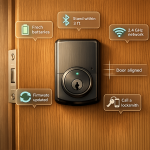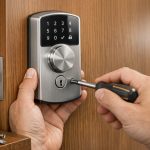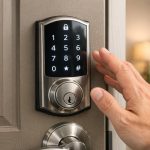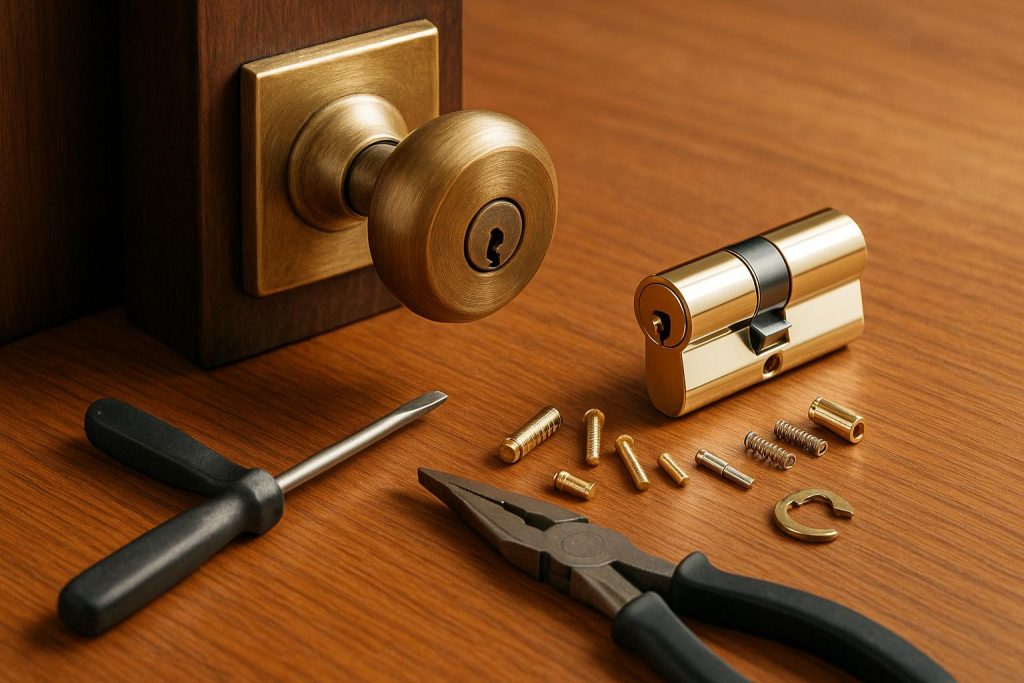When your lock malfunctions, you face a critical decision: repair or replace? The choice affects both your budget and the security of your property. Here’s a quick guide to help you decide:
- Repair is ideal for minor issues like stiff keys, misalignments, or debris buildup. It’s quicker and costs less ($50–$150).
- Replace is necessary for severe damage, rust, outdated security, or frequent repairs. While pricier ($100–$400+), it ensures long-term safety.
Key takeaway: Address problems early to avoid higher costs and security risks. Regular maintenance can prevent emergencies and extend your lock’s lifespan. For expert advice, consult a professional locksmith.
Is it cheaper to rekey or replace locks? | Mr. Locksmith™ Video
Signs Your Lock Needs Attention
Locks often give subtle hints before they fail completely. Spotting these early signs can help you decide whether a repair or replacement is the best course of action. Addressing these issues quickly can save you from unexpected lockouts and maintain reliable security.
When a Repair Will Do the Job
Sometimes, a lock doesn’t need to be replaced – just a little professional care can restore its functionality. Here are some common problems that can usually be fixed without a full replacement:
- Difficulty turning the key: If turning the key feels unusually stiff, it could mean the lock needs lubrication or that some internal components are worn out. Routine maintenance can often resolve this.
- Keys sticking or jamming: When a key slides in but gets stuck or won’t turn, debris in the keyway or reduced tension inside the lock might be the culprit.
- Minor misalignments: Issues like a deadbolt not sliding smoothly or a loose handle can often be corrected by adjusting the strike plate or tightening parts of the mechanism.
- Inconsistent locking: If your lock only works after jiggling the key or behaves unpredictably, a cleaning or small adjustment might solve the problem.
- Temperature-related issues: Locks that stick in colder weather but work fine when it’s warm may just need lubrication or slight adjustments to handle temperature changes.
However, not all lock problems can be fixed with a repair. In some cases, a replacement is the smarter, safer option.
When It’s Time for a Replacement
There are situations where repairing the lock simply isn’t enough. If the damage or wear compromises security, replacing the lock is the better choice. Here are signs that it’s time to upgrade:
- Physical damage: Cracks, dents, or other visible damage weaken the lock’s structure, making replacement necessary.
- Severe rust or corrosion: While a bit of surface rust can be treated, extensive corrosion that affects internal mechanisms means the lock can no longer be trusted.
- Broken keys: If a key breaks off inside the lock, it’s often a sign that the internal components are too worn out to function properly.
- Complete mechanical failure: When the key turns but doesn’t engage the lock, it’s a clear indication that the mechanism is beyond repair.
- Outdated security features: Older locks may lack modern protections, like anti-pick designs or advanced key control. Upgrading to a newer lock can significantly improve security.
- Frequent repairs: If you’re constantly calling for repairs, replacing the lock can save you time and money in the long run.
Knowing when to repair or replace your lock ensures your home or business remains secure without unnecessary hassle or expense.
When to Repair a Lock
Repairing a lock can be a smart move, especially when the core of the lock remains undamaged. It’s a practical way to address common wear-and-tear issues while keeping your security intact and saving money. Knowing when to opt for a repair instead of a replacement can make all the difference.
Here are some typical situations where repairing a lock is the best course of action:
"Lock repair is generally a good choice when the issue is minor, and the lock itself is still in solid condition." – DaniLocksmith
Common Repair Scenarios
Misaligned doors are a frequent culprit behind lock issues. As homes settle over time or as humidity affects door frames, locks can fall out of alignment. A locksmith can adjust the strike plate to ensure the lock fits and functions correctly again.
Sticky or jammed locks often result from dirt or debris buildup. Cleaning and lubricating the mechanism can eliminate these problems, restoring the lock’s smooth operation.
Weather-related damage is another repairable issue. For instance, frozen locks occur when moisture inside the lock freezes in cold weather. De-icing solutions can fix this without harming the lock. Similarly, rust or dirt caused by exposure to the elements can usually be cleaned or repaired without needing a full replacement.
Loose parts are common in older or heavily used locks. Tightening screws and securing connections can bring the lock back to its original stability.
Internal wear and tear often shows up as grinding or clicking noises when turning the key. This can indicate worn-out pins, springs, or other small components that need replacing. A skilled locksmith can address these issues without replacing the entire lock.
Why Repairing Makes Sense
Choosing to repair a lock offers several key benefits:
- Cost savings: Repairing or rekeying a lock is typically far less expensive than replacing it entirely, especially if you’re dealing with multiple locks or working within a budget.
- Minimal disruption: Repairs don’t require altering your door frame or replacing hardware, making the process quicker and less invasive.
- Preserving original systems: For older or custom locks, repairs help maintain the original look and functionality. This is especially important for heritage properties or unique lock systems where the rest of the hardware is still in great shape.
- Keeping your current keys: Repairs allow you to retain your existing keys, avoiding the hassle of redistributing new ones.
"For homeowners or business owners dealing with these issues, lock repairs can be a cost-effective and fast solution. A skilled locksmith can often disassemble the lock, clean or lubricate components, and restore its performance without needing to replace the full unit." – SPL Security Solutions
Addressing lock problems early is crucial. Fixing minor issues promptly can prevent them from escalating into major failures that require full replacements. Regular maintenance, like annual inspections for high-use locks, can catch problems while they’re still easy to fix.
Repairing a lock is often the smartest and most efficient first step when dealing with common lock issues.
When to Replace a Lock
Sometimes, repairing a lock just isn’t enough to ensure your safety. If a lock is too damaged or outdated, replacing it becomes the best course of action. Events like break-ins, visible tampering, or even the desire to upgrade your home’s security are clear signs that it’s time for a change. A new lock not only restores your sense of safety but can also introduce modern features that make life easier and more secure.
Common Reasons to Replace a Lock
Break-ins or attempted break-ins are some of the most obvious reasons to replace a lock. After any security breach, it’s crucial to act quickly. Simply rekeying won’t address potential internal damage to the lock mechanism. And if your keys were stolen or duplicated during the incident, replacing the entire lock is the only way to ensure your safety.
"If someone happened to copy your keys to gain entry, then they should be changed immediately, the same day if possible." – Neal Krombel
Upgrading to smart locks is another reason to consider replacement. These locks provide features like keyless entry, remote access, and the ability to set temporary codes for guests. They offer a practical combination of convenience and enhanced security.
Why Replacing a Lock Matters
Replacing a lock is more than just fixing a problem – it’s an opportunity to improve your overall security. Modern locks often come with advanced features designed to meet today’s safety standards, giving you better control over who has access to your home. Whether you’re addressing damage or upgrading to a smarter system, a new lock can bring peace of mind that repairs simply can’t match.
sbb-itb-643e28e
Repair vs. Replace: Side-by-Side Comparison
Choosing between repairing or replacing a lock comes down to three main factors: cost, time, and long-term security.
Repairing a lock typically costs between $50 and $250, depending on the complexity of the problem and the type of lock. On the other hand, replacing a lock starts at $100 to $300, with high-security or smart locks exceeding $500. While repairs are often the cheaper option upfront, a replacement could be the smarter investment if your lock frequently needs fixing.
Repairs are generally faster since they involve working with the existing hardware. Replacements take more time, especially if you’re upgrading to a complex system or waiting for a new lock to arrive. That said, the added time can be worth it if it means improved functionality and modern security features. Here’s a quick comparison to help you decide:
Comparison Table
| Factor | Repair | Replace |
|---|---|---|
| Cost | Lower ($50–$250) | Higher ($100–$500+) |
| Time Required | Quicker | Longer |
| Security Impact | Restores basic functionality | Adds advanced security features |
| Best For | Minor issues, working mechanism | Severe damage, outdated systems |
| Longevity | May need future repairs | Lasts longer, often with a warranty |
If your lock has been repaired multiple times, was compromised during a break-in, or feels outdated, replacing it might be the better choice. Modern locks often come with advanced security features and updated technology that older models can’t match. Think about your long-term needs when deciding. A replacement could save you from ongoing maintenance headaches while giving you peace of mind.
Professional Locksmith Services in Pittsburgh, PA
When it comes to making the right decisions about your locks, having expert advice makes all the difference. Sherlock’s Locksmith has been a trusted name in Pittsburgh, offering a full range of locksmith services to both residents and businesses. With years of experience under their belt, their certified technicians are well-equipped to help you decide between repairing or replacing a lock, ensuring you get the most cost-effective solution for your needs.
Their team takes a precise approach to every job. Instead of guessing whether a lock needs a quick fix or a full replacement, their experts assess the damage, estimate the lock’s remaining lifespan, and provide clear pricing options upfront. This attention to detail is at the core of their service philosophy.
Why Choose Sherlock’s Locksmith
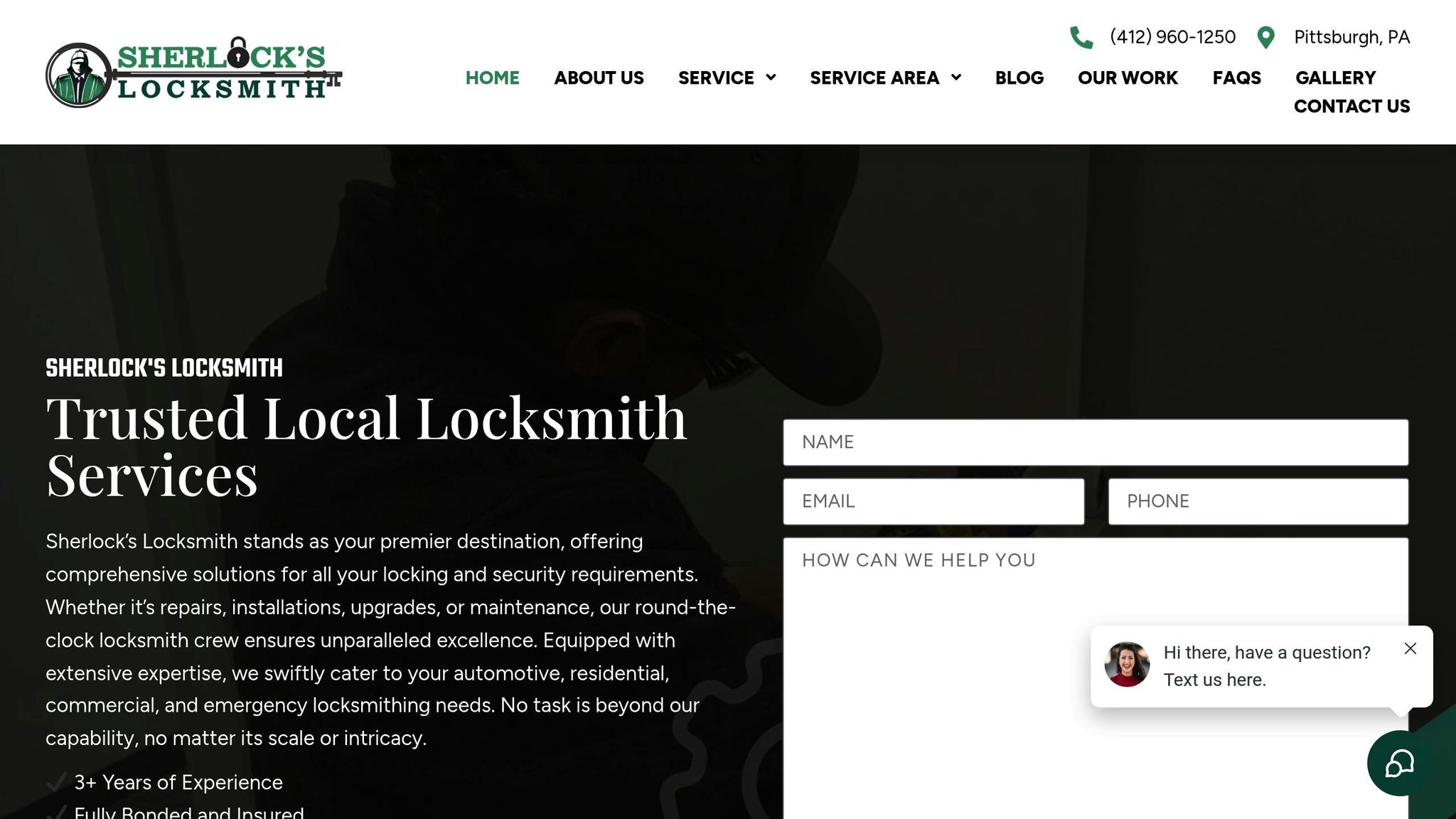
Sherlock’s Locksmith has earned its place as a standout in Pittsburgh, boasting an impressive 4.9/5 Google rating from 122 reviews. Customers frequently highlight their punctuality, professionalism, and fair pricing, which speaks volumes about their reliability and expertise.
One of their biggest advantages is their 24/7 mobile service, ensuring you’re never left stranded during a lock emergency. Whether it’s a residential deadbolt that’s jammed, a commercial access control system in need of an upgrade, or a vehicle lockout, their technicians arrive promptly with the tools and know-how to handle everything from traditional locks to advanced systems.
Beyond their technical skills, Sherlock’s Locksmith provides peace of mind. They’re fully bonded and insured, so you can trust that your property is in safe hands. Plus, their technicians stay up-to-date with ongoing training, making them adept at working with both mechanical locks and cutting-edge smart lock technologies.
"The person that came out was very professional. He was also here in a timely manner. I would definitely recommend. The price was also great as well." – Katrina Christy, Customer
Comprehensive Service Options
Sherlock’s Locksmith offers a wide range of services to meet any lock-related need. For homeowners, they handle lock installation, repair, rekeying, and even security system upgrades – ideal for those looking to move from standard locks to high-security options. On the business side, they provide services like access control systems, master key systems, and security consultations to help companies make informed choices about their lock setups.
Their automotive services are just as thorough. They assist with car lockouts, transponder key programming, and support a variety of vehicle types. Their emergency response is especially noteworthy, with technicians often arriving within 15 minutes, fully prepared to resolve the issue efficiently.
"Communication was great with the tech Tom. He gave me ample notice before the appointment time. Once there he walked me through the options and the job went much faster than I expected. The price was very fair too. I’d recommend them!" – Matthew Kravits, Customer
Another highlight is their transparent and competitive pricing, which helps customers confidently weigh repair versus replacement costs. To top it off, they offer comprehensive warranties on their work, ensuring you feel secure no matter what service you choose. Whether you’re dealing with a minor repair or a full lock replacement, their range of options makes it easy to find a solution that fits your needs and budget.
Making the Right Choice for Your Lock
When it comes to deciding between repairing or replacing a lock, the key is to start with a thorough evaluation of the lock’s condition. Instead of jumping to conclusions, take the time to pinpoint the exact issue. Is the lock worn out, damaged, or simply outdated? Understanding the problem will guide you toward the right solution.
This is where a professional inspection can make all the difference. A trained locksmith can provide an expert assessment, helping you weigh the pros and cons of each option. Their insight ensures you’re not just guessing but making a well-informed decision.
At Sherlock’s Locksmith, our certified technicians specialize in these evaluations. They’ll help you choose a secure, budget-friendly solution tailored to your needs. With their expertise, you can feel confident that your lock will be handled properly, avoiding unnecessary costs or risks.
Don’t leave your security to chance – consult a professional to ensure your lock is in the best possible shape.
FAQs
How do I know if my lock needs a repair or a full replacement?
Determining whether to repair or replace your lock depends on how serious the problem is. Smaller issues, like a key sticking, trouble turning, or a loose mechanism, can often be resolved with a simple repair. These problems are usually caused by regular wear and tear or dirt buildup and don’t typically affect the lock’s overall security.
On the other hand, if the lock is badly damaged – for instance, after a break-in – or shows clear signs of heavy wear, such as rust, cracks, or broken parts, replacing it is usually the better choice. Replacing your lock is also a smart move if it’s outdated or you want to upgrade to a more secure model.
If you’re not sure what’s best, a professional locksmith, like the experts at Sherlock’s Locksmith, can evaluate the situation and guide you toward the right decision. While regular maintenance and timely fixes can keep your locks working longer, your security should always come first!
What are the benefits of upgrading an old lock to a modern security system?
Upgrading an old lock to a modern security system brings a higher level of protection, making it tougher for intruders to break in or tamper with. Many of today’s locks come with advanced technology, like smart features, that let you manage and monitor access remotely using your smartphone or other connected devices.
Beyond better security, these systems are built to last, cutting down on the hassle and cost of frequent repairs. They also add convenience to your life with options like keyless entry – no more fumbling for keys. Plus, they offer the reassurance that your property is safe and secure, giving you one less thing to worry about.
How often should I maintain my locks to keep them secure and working properly?
To ensure your locks stay secure and function smoothly, aim to maintain them at least twice a year. However, if your locks are in high-traffic areas or face tough environmental conditions, it’s wise to check them every three to six months.
Basic maintenance involves cleaning, lubricating, and inspecting for any wear or damage. These straightforward steps can help you avoid problems, keep your locks working longer, and maintain the security of your property.



